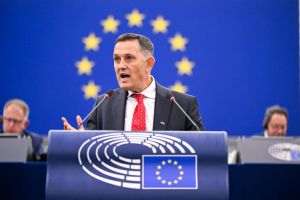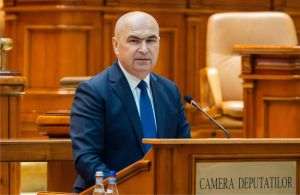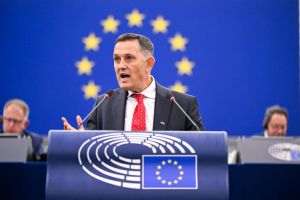The stand-by agreement concluded by Romania with the International Monetary Fund expires at the end of September and the political environment is abuzz under the rhetorical responsibility of whether a new one ought to be signed or not. Both the government, as well as the parliamentary are revolving their speeches around necessity: does Romania really need another agreement with the IMF or could Romania "perform", from now on, without help from the international financial institutions?
Also two years ago, the Turkish government, led by Recep Tayyip Erdogan, implemented a similar action when it comes to the payment of foreign debts - which Romania also succeeded in doing in 1989 -, as in May 2013 Turkey fully paid off its debt to the IMF and repaying one last installment of 421 million dollars. But unlike Nicolae Ceauşescu, Recep Erdogan did not want to terminate his working relationship with the IMF, quite the opposite, he sought the role of a leader within it: one month later, Ankara made available to the institution a fund of 5 billion dollars, to finance the debts of the European countries.
In doing so, Turkey changed its debtor status it had for over 50 years in its relationship with the IMF to a new status, of creditor to others.
Compared to Romania, the Turkish state does not lack its own capital, nor political will.
In Turkey, domestic capital is dominant, so a "national economy exists", which gives the Turkish state the power to negotiate with other states, with multinational companies and within the international organizations it is a part of. Romania also lacks the money, as well as the political perseverance subsumed to strategic economic objectives and with a national nature. In short, Romania isn't setting the goal for itself to become a standalone economic power, it only reaps the predominantly positive fruits of the foreign investments made here over the last ten years, as a new territory generated by the expansion of the European Union.
Therefore, the Romanian government, as manager of this country, is not in a position to negotiate effectively, and that applies not so much in its relationship with the IMF as it is on the relationship with the international finance. When it sits down in Bucharest at the negotiating table, the Romanian state sits on a chair that isn't its own and it is held up by its armpits through the not always congruent efforts of the Ministry of Foreign Affairs and the Ministry of Public Finances. At this time, when the issue of the vulnerability of nations to the volatility of foreign capital is at its most ardent, Romania in fact has a symbiotic connection with the IMF: it is like Bambi, the deer, and it is safer in the courtyard of the IMF, than off by itself in the forest, where it is stalked by many hungry wolves, disguised as private financial institutions and corporations with turnovers that exceed the GDP of many countries.
To weak countries, the protection fee charged by the IMF is preferable to the devastation which the major banks can wreak, especially since it grants the prospect of eventually getting its own seat at the table, like Turkey does now. At the opposite end of the spectrum, an example from Mexico's recent history shows how these banks can influence the political will of an allegedly sovereign state.
Today, the United Mexican States celebrate their National Day - Happy Birthday! -, with September 16th being the day when, almost two centuries ago, the insurgency movement began which led to gaining their independence from Spain. On January 1st, 1994, in the Mexican province of Chiapas a different kind of insurgency began, started by a guerilla group called "The Zapatista Army of National Liberation", which most of the locals rallied behind. The Zapatistas were accusing the Mexican government of disregarding the needs of the people and declared war on it the day the NAFTA agreement - which had as its signing parties the three North-American states - was coming into effect, because they viewed it as extremely detrimental to the rural population in Mexico. In particular, they were demanding that the local population get a fair share of the exploitation of natural resources, as well better healthcare and education.
After two weeks of heavy fighting, the Catholic Church negotiated a truce between the Mexican Army and Zapatistas, which lasted a year, and the latter kept their control over the Chiapas police. In January 1995, the Chase Manhattan bank sent a memorandum to the Mexican government, in which it expressed the opinion that "even though the Zapatista movement does not represent a threat to the political stability of Mexico, it is perceived as such by many people in the investor community. As a result, the government must eliminate the Zapatistas to prove the effectiveness of the control it holds over its territory and its security policy". The author of that memo was Riordan Roett, emerging market consultant for Chase Manhattan bank, which subsequently a consultant to the National Intelligence Council of the CIA. Two days later, the Mexican army started a massive offensive in the Chiapas province, and succeeded in "liberating" from the Zapatistas and even to drive away the residents of the villages that were allied to them.
Chase Manhattan bank already had a less than honorable reputation, as it was known for the deals it made with Nazi Germany, which culminated in the freezing of the bank deposits that Jews had in occupied France. In 2000, it merged with J.P. Morgan & Co. and became J.P. Morgan Chase Bank, which currently has over 2.6 trillion dollar in assets and is part of the "Big 4" group of US banks. Meanwhile, the Zapatista Army of National Liberation has survived and still holds control of a large part of the Chiapas province.
In the context of this story, what is worth noting is that no bank ever sent a memorandum urging the Mexican federal government to "more effectively control the territory" ruled over de facto by the drug cartels in Mexico. In other words, the cartels aren't a problem, but the potential of revolutionary movements to destabilize governments which support the major lenders is.
Romania is a member of the IMF and within the Fund it has allies, with the help of which it can follow along Turkey's model or follow its own path. A new standby agreement can even prevent slip-ups of those holding the political reigns in Bucharest, whoever they may be in the coming period, especially when it comes to directions suggested "in a friendly manner" by the secretive agents of such foreign private banks. The relationship with the IMF is in fact, the only support that Romania has in relation to the international financial.










































